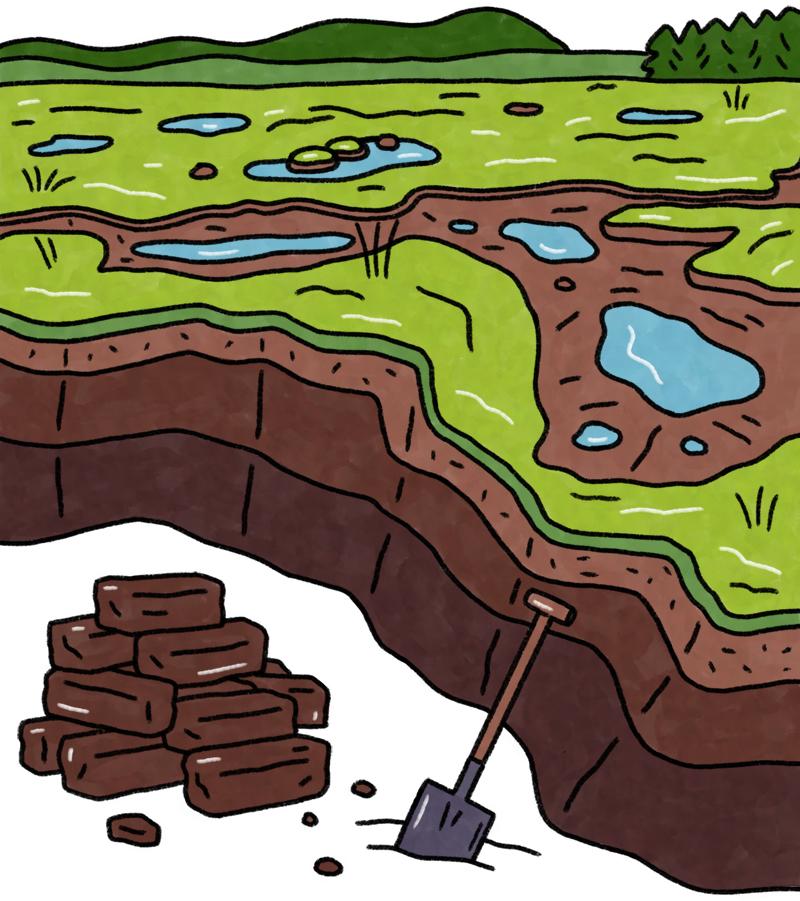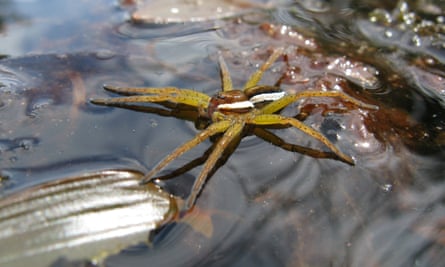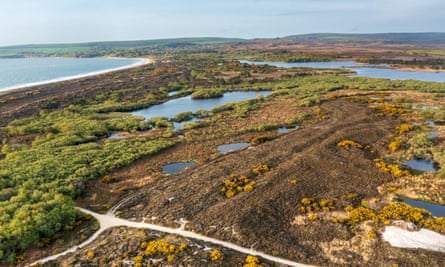Floating spiders and insect-eating plants: leaky dams revive Dorset's bogs


Porous dams in Purbeck are being used to 'rewet' the mires, bringing a richer landscape for flora and fauna

Rewilding, again...

Porous dams in Purbeck are being used to 'rewet' the mires, bringing a richer landscape for flora and fauna
Leaky dams may not sound ideal but they are being used to great effect on dried-out marshland in the English West Country to produce fresh habitat for carnivorous plants and a spider that whizzes over the surface of water to grab prey.
Bales made out of heather and bunds constructed out of peaty soil and timber are being used to create porous dams on two mires, Agglestone and Greenlands, in Purbeck, Dorset.
The idea is that they block artificial ditches originally dug to drain marshes for conifer plantations or to graze farm animals and encourage the water to seep away slowly and "rewet" the dried-out mires, which are managed by the National Trust.
Dank, ancient and quite fantastic: Scotland's peat bogs breathe againRead more
David Brown, the charity's lead ecologist in Purbeck, said this would bring about a richer landscape for flora and fauna and create fresh peat, an excellent carbon store.
Brown said: "Spreading the flow of water across the mires will create a wetter habitat, where mosses and rare plants like marsh saxifrage and tiny bog orchids can thrive. Purbeck's mires have enormous significance for rare insects, plants and other wildlife, including bog hoverflies and birds such as skylarks.
"Under the acidic, waterlogged conditions, mosses and other plants never fully decompose, and over time they turn into new peat, which keeps their carbon locked up instead of releasing it into the atmosphere."

A rare raft spider on top of floating vegetation in a pond.
The marshes are part of what was designated England's first "super national nature reserve" in 2020, a mosaic of heaths, woods, reed beds, salt marsh, dunes and mires.
They are among 16 peaty sites in Dorset, covering a total of 425 acres (172 hectares), being improved as part of the £1m Dorset Peat Partnership project.
Work was completed last week at Greenlands mire and already the water has pooled up against the dams and started to spread. Work on Agglestone mire, close to a spectacular feature called Agglestone Rock, also known as the Devil's Anvil, is beginning this week.
Brown said: "A new wetland ecosystem should establish itself quite quickly, providing a lifeline for many rare species that have been under threat due to the disappearance of these boggy habitats across the country. This includes many species of invertebrates, like the nationally rare raft spider, an aggressive hunter which feels the vibrations of potential prey on the bog pools with its legs and rushes out to catch it, floating like a raft.
"Insects attract birds and mammals, including rare nightjars that nest on the heathland and feed over the mires, and even benefit some rare plant species that grow on the peat bogs, including carnivorous plants, which rely on capturing and digesting insects to supplement their diet on the nutrient-poor bog."
 Purbeck's mires have enormous significance for rare insects, plants and other wildlife.
Purbeck's mires have enormous significance for rare insects, plants and other wildlife.
Among the carnivorous plants is the Godlingston Sundew, named because it was originally found on Godlingston Heath in Purbeck.
Another part of the project includes cutting back invasive purple moor grass, which has thrived in the face of recent droughts and is threatening to smother other more delicate wetland species.
Brown said: "Rewetting the mires will also improve drought and fire resilience by holding more water in the landscape during the summer, as well as helping to prevent flooding by soaking up heavy rainfall."
The project is supported by Natural England's nature for climate peatland grant scheme, which contributes more than £50m to peatland restoration projects across the country. The UK government says 87% of England's peatlands are degraded, damaged and dried-out.








"Peat" isn't exactly sexy... but having a world the day after tomorrow isn't sexy either...
Hope they keep this project moving and expanding to other areas.
Here in the US we started on the largest dam removal in our history. Four dams on the upper Klamath River in Oregon and California we be gone in a few short years, the first one is already been breached.
The Puyallup Tribe won a major victory.
Keep on rewilding across the world.